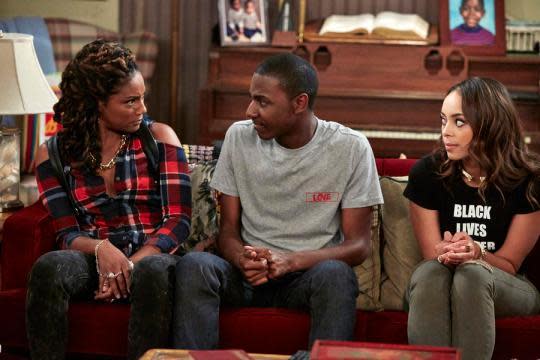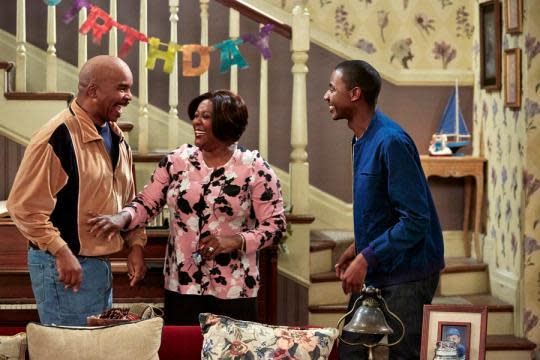Jerrod Carmichael on His Old-School NBC Sitcom: 'I'm a Believer in No Hook. Just Characters'

With a buzzy HBO stand-up special already under his belt, Jerrod Carmichael might seem like the hip, young comic on the block. But his inspirations are a little more old-school than you might expect.
“Norman Lear was a big influence for me,” Carmichael tells Yahoo TV, explaining the retro vibe of The Carmichael Show, premiering this week on NBC. He also name-checks Bea Arthur (!) and Jack Benny (!!) while previewing his new sitcom, starring him and Amber Stevens West as a young couple moving in together and David Alan Grier and Loretta Devine as his parents.
Related: Ken Tucker Calls ‘The Carmichael Show’ a ‘Likable Laugh-Getter’
So what’s the show about? Well, that’s where it gets tricky; Carmichael resists the idea of what he calls an “over-plotted comedy” that you can sum up in one sentence. Instead, he wants The Carmichael Show to focus on characters and deal with the issues we face today, from Ferguson to religion, much like Lear’s All in the Family did back in the 1970s.
We also chat with Carmichael about his aversion to self-promotion, the long evolution his show went through before reaching the air, Grier and Devine’s real-life chemistry, his enduring love for The Golden Girls, and why you shouldn’t judge his show based on the trailer.
I really enjoyed your HBO stand-up special Love at the Store, but I don’t think a lot of people know who you are yet. You don’t even have a Wikipedia page!
No Wikipedia, no website, no headshot. No anything! [Laughs.] It’s kind of like the Field of Dreams mentality, you know? The “it” that I’m building is just material; it’s the actual content. That’s the most important thing for me. So even outside of that, I’m not huge on social media. And it’s not anything against it, but it’s just like: I like creating, I like performing live, I like writing things. And anything else written about it outside of that probably won’t come from me. [Laughs.]
Your new NBC sitcom: How many different incarnations did it go through before you settled on this concept? Because you made a different pilot last year, right?
Yeah, I met with NBC for the first time in 2011. We had a great meeting, and we did a presentation at the end of 2013 that didn’t go. But we kept developing it, and we came to this show, which we’re very, very happy with. You just kind of constantly find it. You try and find who these characters are, and what’s the story we want to tell. And I’m glad we had such a long process to try and figure that out. Because a lot of times, it’s easier to just jump in and be like, “Alright, I’ve got this idea” — kind of throw spaghetti at the wall.
But a lot of times with development, it kind of mirrors the ‘70s, with All in the Family. In the '70s, things didn’t have a lot of time to grow. They weren’t developing as many shows, but they also didn’t have much time to grow, because they were used to a certain amount of numbers, and the turnaround was really, really fast. Norman Lear developed All in the Family with three incarnations before settling on the one that we saw. So we’re kind of back in that space where things don’t have a lot of time to grow once on the air. You need to know these characters, and you need to find this rhythm, because things are being replaced really, really fast. So I’m glad we had a chance to go through the development process before the public saw it, so now we feel very confident in the story and the characters and the intention behind it. And I just realized, I rambled for far too long. [Laughs.]
That’s OK! In the pilot, your character is moving in with his girlfriend and his parents find out about it, so they freak out. But that’s really just the jumping-off point for the show, right?
That’s honestly just the pilot. That’s just a piece of the story. In response to, in my opinion, the over-plotted comedies — “We’ve gotta give them a hook” — I’m a believer in no hook. Just characters. So much of the process of making it was fighting against the hook. Because I really believe that if you have strong enough characters, that’s hook enough. Like, with Seinfeld, the hook becomes the narrative later, after you’ve seen the show: “Oh, I guess the hook was that it was about nothing.” Which is just something they said later.
So with my girlfriend moving in and I don’t tell my parents, that’s just the story of the pilot. Truthfully, what the show is, if I can boil it down to one word, it’s a conversation. What’s important for us is to have a show that reflects events that go on in our culture, and things that people genuinely talk about in their homes, as opposed to these overcomplicated stories. We just want to take very honest subjects, and just talk about them. There are so many different sides of attacking one subject. And that’s what’s important for us. So I think the best description I can give of the show is: It’s a conversation. A conversation between a couple, between generations, our relationship with my parents… it’s just us talking about things.

You mentioned All in the Family earlier. So that was an inspiration for you, the way it tackled current issues?
Yeah, Norman Lear was a big influence for me. I read this piece in The New York Times about Norman Lear. And it talked about how, in the '70s, there was so much going on: post-war, and economically, and racially, and all these things happening in America. And it’s like, you wouldn’t know it from watching television, or from watching the sitcom. The sitcom existed in a world removed from the real one.
So that’s what Norman Lear did so well: He put his finger on the pulse of America, and he said, “No, I’m gonna talk about what you guys are really talking about.” So that’s how I picture our show: just to put our finger on the pulse of America, and talk about real issues and real topics. We don’t run away from Ferguson. We don’t run away from religion. We don’t run away from these things. We really want to talk about them, because we feel like it’s important.
You also have a couple of great TV veterans in the cast playing your parents: David Alan Grier and Loretta Devine. Did they show you the ropes of how the TV business works?
Well, first of all, their chemistry is amazing. They met in 1984; they were in the original cast of Dreamgirls on Broadway. So they have a very real history, and they’re genuinely friends. The chemistry between them is amazing, because it’s very honest, and very real. And I’ve been fans of them literally since… I said to Loretta, “I’m never gonna make you sound old, but I’ve been watching you for forever! I’m so excited to work with you!” So with them, they go into it with a really great comfort… but really, an excitement. If I’ve learned anything from them, it’s to remain excited about everything that we’re doing. Every scene. Loretta loves finding the character, and so does David. They are actors, you know what I mean? It’s not just comedy. Real-life actors! Can you imagine?

Yeah, do they help you out with the acting side of it? Have you done much acting, outside of stand-up comedy?
Stand-up comedy is such a big acting class in itself, you know? You’re putting on a one-man show every day. That’s how I look at it. You’re directing, starring in, writing a one-man show every night, multiple times a night. And so that’s kind of my acting class. But at the same time, yes, I’m crazy inspired by both Loretta and David, just their enthusiasm. Those tape nights, just watching the audience react to them, these big reactions — they’re screaming! It’s such an enthusiastic response. If anything, you learn through the beauty of synchronized competition: the healthy version of it, where I need to be at my best because you guys are so great. It’s kind of that on set; that’s the feeling. And that’s how I’m inspired by them.
Besides All in the Family, are there any other TV shows, past or present, that you look to for inspiration in making this?
I’m in love with things that tell honest stories in a very grounded way, and focus so much on character. I’m in love with Cheers… you know, The Golden Girls was phenomenal. [Laughs.] Bea Arthur is one of my biggest influences. Between her and Jack Benny, they have some of the best timing ever. Her reaction shots! Any time she reacts to Betty White’s character, and it’s just this look of frustration and concern that she’s able to get across — with no lines! It’s just all expression. It’s so great. So I’m just in love with actors, you know what I mean?
I’m excited to see the show. I’ve only seen the trailer so far.
Let me tell you this — and NBC is gonna kill me — but I’m gonna say that the show is much better than the trailer. [Laughs.] Look, I think a lot of things operate out of this fear, right? This fear of, if you don’t have the hook, they won’t watch. But people are watching for characters. Even the dramas that are doing well, from whatever Shonda Rhimes has on to Empire, it’s all because these characters are very interesting. So a lot of the trailer is rooted in the fear of, “Let’s give 'em the hook!” And also, trailers just become a series of punchlines with no rhythm. I could complain for hours. If you need a headline: “The Show Is Better Than the Trailer.” [Laughs.] I promise you.
The Carmichael Show premieres Wednesday, Aug. 26 at 9 p.m. on NBC.
